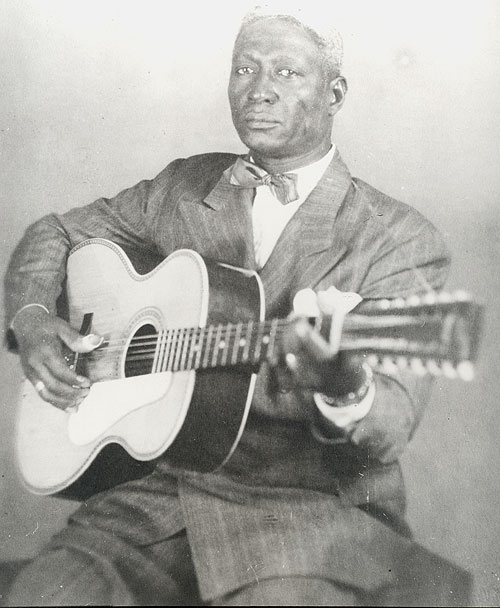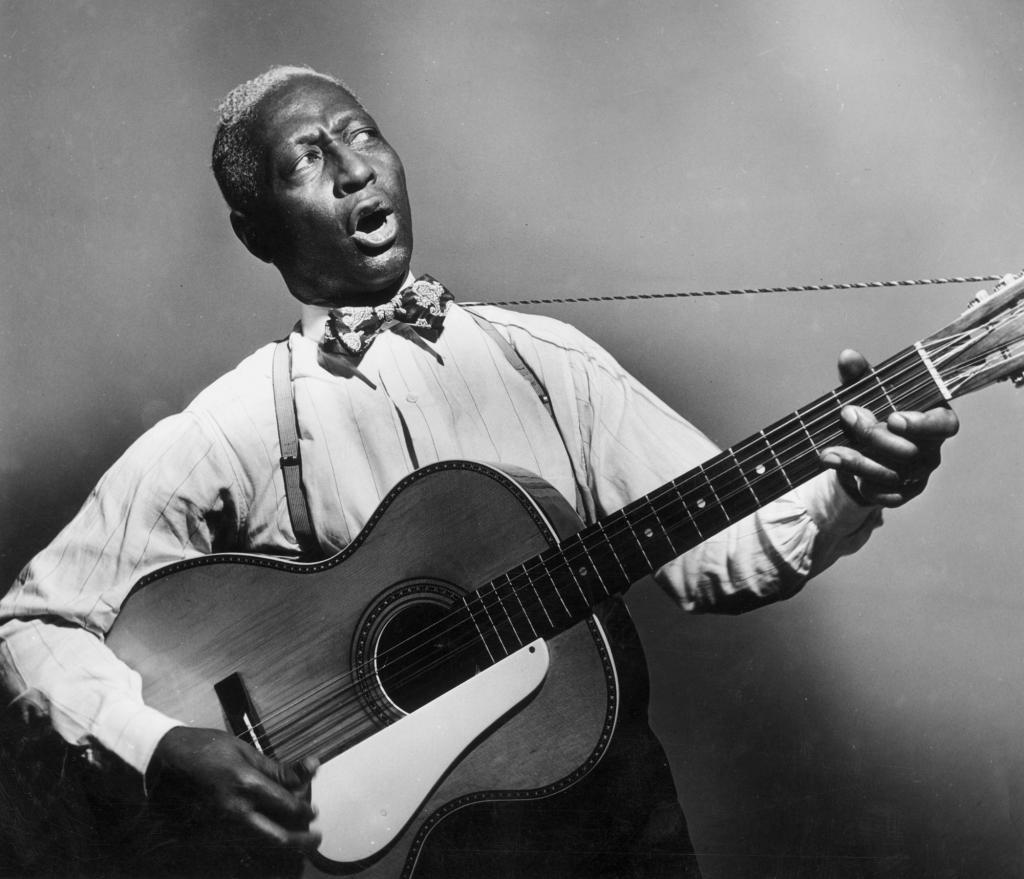This is the sixth in a series of articles about the Folk Americana Roots Hall of Fame’s (FARHOF) inaugural class of inductees. The first induction ceremonies will take place in April although an exact date has not yet been announced. This article is the first to focus on the Solo Legacy category. A solo legacy artist is a performer whose initial impact on the genre was at least 45 years prior to the year of Induction.
Huddie Ledbetter was born on January 10, 1888, on the Jeter Plantation near the town of Mooringsport, Louisiana. Little is known about his early years other than his family moved to Texas when he was around the age of five. According to him, he broke up a fight between his parents when he was eight years old by hitting his father over the head with a poker and threatening him with a shotgun.
Violence and trouble would follow wherever Ledbetter went for the first 40 years of his life. He was a huge man with an even larger temper. He was forced to leave home at 18 after impregnating the same woman twice. He moved to Texas where he met Blind Lemon Jefferson who became his friend and mentor. The two performed together for a time and Ledbetter perfected playing the 12-string guitar. The 12-string would become his trademark and instrument of choice.
Sometime around June of 1915 he was arrested in Louisiana, possibly for assaulting a woman, and was convicted of carrying a pistol illegally. He was sentenced to 30 days on the chain gang. He escaped, moved to Bristol, Texas, and lived under the name of Walter Boyd. In December 1917 he was arrested for the murder of his cousin’s husband. He was convicted on June 7, 1918, of the murder and for “assault to murder” another man. He was convicted on the two separate charges and sentenced to 7 to 30 years in prison.
It was during this stint in prison he gained the nickname Lead Belly. Many refer to him as Leadbelly but he always signed his name “Lead Belly.” Also while there he wrote a song asking for a pardon. In January 1924 he sang the song for Texas Governor Pat Neff and a year later Neff, who was at the end of his term, granted the pardon.
In January 1930 Lead Belly was once again charged and found guilty of assault with intent to murder. This time the sentence was for six to ten years in Angola Prison in Louisiana. It was here where he was introduced to John Lomax and his son, Alan Lomax. It was the start of a short but beneficial relationship. The Lomaxes helped Lead Belly, who was eligible for early release, petition Louisiana Governor O.K. Allen for his release.

Lead Belly worked for John Lomax for a time but they eventually parted ways with bitterness and hard feelings on both sides. Lomax found Lead Belly unreliable. Lead Belly sued Lomax over money owed to him. A settlement was worked out that allowed John Lomax to use Lead Belly’s songs in his book Negro Folk Songs as Sung by Lead Belly, published in 1936. Lead Belly also was persuaded by Alan Lomax to record more songs for the Library of Congress.
It was these recordings by John and Alan Lomax that brought “Midnight Special,” “Goodnight Irene,” “The Rock Island Line,” “Cotton Fields,” and many others to the public consciousness. Thanks to these and later recordings by Lead Belly those songs have become folk music standards recorded by numerous performers in the past century.
It is doubtful Lead Belly authored any of the songs he popularized. It is most likely he added to or adapted songs he heard while working in the fields, or in prison, or from the time he spent with Blind Lemon Jefferson. For example, the lyrics to “Midnight Special” had been lyrics printed as early as 1905, though with lyrics differing from the version recorded by Lead Belly. “Goodnight Irene” likewise had been performed previously under the title “Irene” and with somewhat different lyrics.
Regardless of whether the songs were written by Lead Belly or were derivative of other works, it is certain he was the first to bring them to the public. And when he moved to New York City in 1935, he became a fixture in folk music venues and worked with Pete Seeger and Woody Guthrie. His influence can be heard in their works. He performed in union halls and supported some political causes but was generally apolitical.
Bob Dylan credits Lead Belly for getting him into folk music. In his Nobel Prize Lecture, Dylan said “somebody – somebody I’d never seen before – handed me a Lead Belly record with the song ‘Cotton Fields’ on it. And that record changed my life right then and there.” George Harrison, Van Morrison, Ronnie Wood (of the Rolling Stones), and others have similarly credited him with influencing not only them but the blues, folk, and rock genres generally.
Lead Belly began a tour of Europe in 1949, hoping to build a following there. He fell ill before its completion and was diagnosed with ALS – amyotrophic lateral sclerosis – better known as Lou Gerhig’s disease. He died on December 6, 1949 in New York City.
Six months later, The Weavers version of “Goodnight Irene” became the first folk song to hit #1 on the U.S. music charts, selling 2 million copies. The folk revivals of the 1950s and 1960s were set in motion.
Lead Belly was inducted into the Blues Foundation Hall of Fame in 1986 and the Rock and Roll Hall of Fame in 1988.
Next up: Woody Guthrie


